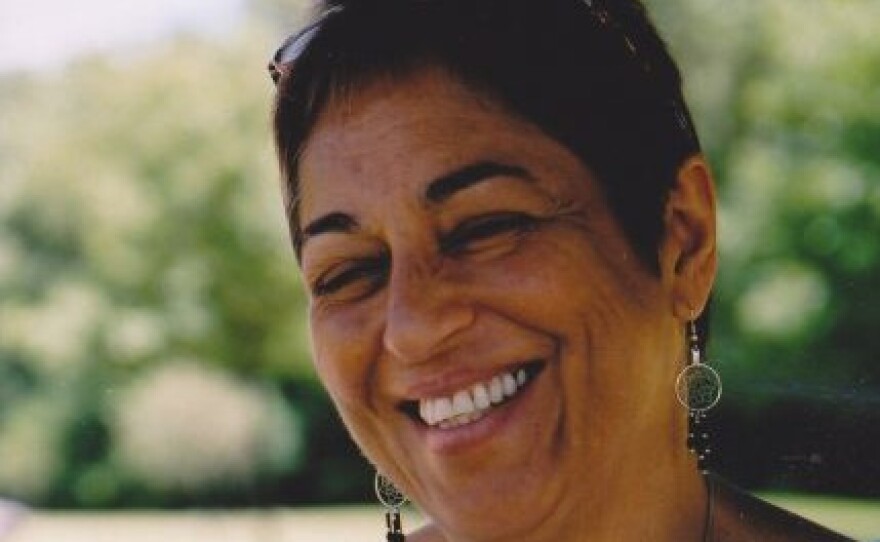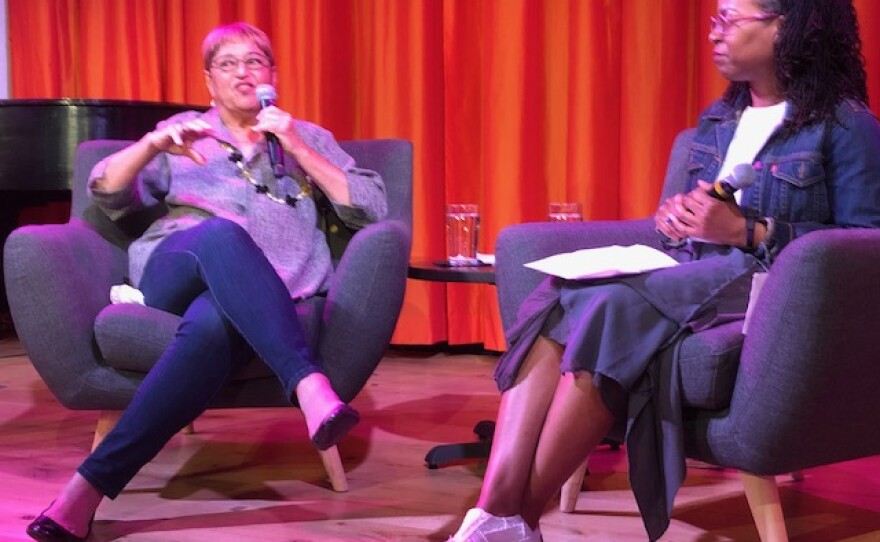Among poets, explicitly writing about one’s own life is rarer than some readers might think. That makes the title of Toi Derricotte’s new book, “‘i’: New and Selected Poems,” a bit unusual.
There was a time, after all, when the phrase “confessional poetry” was pejorative. Even today, readers are advised not to assume the “I” in a poem refers to the poet herself, as opposed to some fictional persona.

Yet throughout her nearly half-century career as a poet, Derricotte, 78, has boldly mined her childhood and everyday life.
Doing that well is harder than it sounds.
“(What is ‘I’?),” Derricotte asks in one new poem. “A transmission through space? / A dismemberment of the spirit? / More like opening the chest & / Throwing the heart out with the gizzards.”
Along with three dozen new poems, “i” (University of Pittsburgh Press) spans Derricotte’s five previous poetry collections, from 1978’s “The Empress of Death House” to 2011’s “The Undertaker’s Daughter.” The material is often wrenching. Derricotte returns frequently to her childhood relationship with her parents, especially her father, who terrorized and beat her. Writing as a light-skinned African American, she frequently explores race and racism. And poems from her 1983 collection “Natural Birth” recount her experiences as a young woman in the early 1960s, giving birth in a home for unwed mothers.
“You’re really putting out there your vulnerabilities, and it’s dangerous,” she says. “I mean, the most difficult poems I had to write were not about what other people did to me, but, you know, what I did mostly to myself.”
Derricotte’s work is known nationally. In its starred review of “i,” Publishers Weekly called her “a seminal figure in the American poetry community.” Her many honors include the 1998 Paterson Poetry Prize, for her collection “Tender,” and the 2012 PEN/Voelcker Award for Poetry, for her body of work.
"You're really putting out there your vulnerabilities, and it’s dangerous"
She’s revered as an educator as well: She’s taught for three decades at the University of Pittsburgh, where she’s now a professor emerita, and in 1996 she co-founded, with poet Cornelius Eady, Cave Canem, a collective for African-American poets that’s widely credited with raising the status of black poetry in America.
Derricotte’s early poetry arrived at a time when black voices in poetry were scarce, and those of black women even scarcer.
“She becomes hugely important in that regard alone, for women of color to be able to sort of see themselves in their various selves,” says Randall Horton, a poet and English professor at the University of New Haven, in Connecticut.
Horton is himself a former fellow at Cave Canem, a nonprofit that has provided workshops and networking for hundreds of black poets. (Its summer residency is held annually on the Greensburg campus of the University of Pittsburgh.) Horton says Cave Canem has been invaluable to him.
“It’s the idea of you being able to call me right now and talk about poetry, that’s what Toi is,” he says in a phone interview.
For younger black poets, it seems hard to overstate the impact of Cave Canem. As a resource for African-American poets, it was preceded by groups like the New York City-based Dark Room Collective. But by the late ’90s, Cave Canem (Latin for “beware of the dog”) struck the poets who studied there as a unique space in a culture that wasn’t receptive to their voices.
“It’s still important for black poets to have a place where they can go, where we can go, to feel safe and as if we can be ourselves and write the poetry we want to write,” says Dawn Lundy Martin, an award-winning poet who was a Cave Canem fellow in the ’90s and is now Derricotte’s colleague at Pitt. Poet Nikki Finney, a National Book Award Winner, has called Cave Canem "the major watering hole and air pocket for black poetry."
It's the idea of you being able to call me right now and talk about poetry, that's what Toi is"
Derricotte grew up in Hamtranck, Mich., near Detroit. After giving birth to her son, she graduated from Wayne State University and in the late 1960s moved to New York City. She later earned a master of arts in English literature at New York University, and began teaching. She was recruited to the University of Pittsburgh by Ed Ochester, the poet and professor who was and is head of the poetry program at the University of Pittsburgh Press.
“American poetry was largely a, white, and b, quite formal, in a number of different ways,” says Ochester. “Toi was one of the people who struck me as being able to create a poem that was conversational, and yet at the best had great qualities of movement and ambition and most of all, of soul.”
Derricotte’s best-known students include Terrance Hayes, who won a National Book Award for his 2010 collection “Lighthead” and later was awarded a coveted MacArthur Foundation fellowship, or “genius” grant. Hayes, who did graduate studies at Pitt and later taught there, remains a close friend of Derricotte’s who says he admires her dedication to getting to the truth in her work.
“She’s always questioning herself, she’s questioning the audience, and I’ve always taking that as a lead,” says Hayes, now a professor at New York University. “So that makes me be self-critical and often doubtful about what I’m trying to do.”
"It was scary to be visible in my childhood. I'd get knocked down."
Derricotte writes incisively about race and racism. She has explored the divisions in the African-American community of her childhood between lighter-skinned and darker-skinned people. In her poem “Passing,” she describes a white woman who seems upset to learn that Derricotte is black. “Why presume / ‘passing’ is based on what I leave out / and not what she fills in?
Derricotte has a reputation for getting her students to cross difficult emotional terrain, and does so in her own work as well. Her new poem “Pantoum for the Broken” begins: “How many of us were fingered? / A soft thing with a hole in it, / a thing that won’t tell, that can’t.” It ends:
If we escaped, will we escape again?
I leapt from my body like a burning thing.
Not wanting to go back, I make it happen
until I hold the broken one, hold her and sing.
Martin, the University of Pittsburgh professor, says Derricotte excels at this kind of “hard poem.”
“I think that violence is hard to look at,” says Martin. “She’s able to really take the image, make it so that you get in really, really close to it, and feel it in a way that is both inviting and bodily, I guess.”
But Derricotte says that early in her career, she struggled to tell such troubling stories.
“There were so many voices inside me that were pressing against me being visible,” Derricotte says. “It was scary to be visible in my childhood. I'd get knocked down. And so I learned how to knock myself down before I put myself out there and became vulnerable.”
Her work changed course with her 2011 collection “The Undertaker’s Daughter,"in which she wrote, "I am not afraid to be memoir."
“Writing these poems in ‘The Undertaker’s Daughter’ helped me to separate out those voices and to see that wasn't me,” she says. “The ‘me’ was the voice underneath there, determined to live. To express itself. That was me.”
“I,” which samples all five of her previous collections, tracks her growth.
“It seems to me that there’s a progression through these various parts of my life that have been repressed, and then, you, know brought forth in the poems, and to what I'm doing now, which feels a lot less like argument and more like sort of how shall I say sort of I don't know just kind of being with myself and kind of happy expression is the way I could put it.”
One of the new poems in “i,” "Blessed angels," begins, "How much like / angels are these tall / gladiolas in a vase on my coffee / table, as if in a bunch / whispering."
Derricotte’s book launch was held April 7, at Alphabet City, on the North Side. As she told some 120 supporters at her reading that night, “That’s why it’s called ‘i,’ because in every book there’s some aspect of myself that’s getting unburied.”






